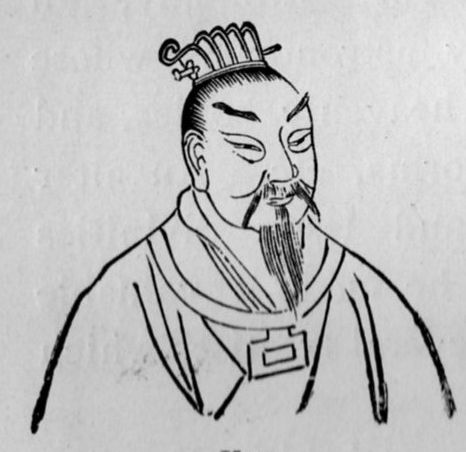|
Xu You (hermit)
Xu You or Hsü Yu () was a legendary Chinese recluse who lived during the reign of the Emperor Yao (traditionally c. 2356–2255 BC), residing next to the Ying River. The emperor allegedly offered him the royal throne towards the end of his rule. Life Xu You denounced the society and retreated to the north of Ying River. Living a simple life, he scooped river water with his bare hands, even though he had a ''hulu'' (an ancient water bottle shaped like a gourd). Xu was a disciple of the female teacher Gnaw Gap, whom Xu described as "lendinga myriad things ..senior to high antiquity but is not aged". The legendary ruler Emperor Yao regarded Xu with utmost respect and requested that he be his teacher. They shared a positive relationship, towards the end of Yao's rule (traditionally believed to be circa 2256 BC), the ruler chose Xu as his successor. (Much later, the Chinese sage Confucius greatly lauded Yao's decision to appoint Xu as the next emperor in line.) However, Xu refused t ... [...More Info...] [...Related Items...] OR: [Wikipedia] [Google] [Baidu] |
Emperor Yao
Emperor Yao (; traditionally c. 2356 – 2255 BCE) was a legendary Chinese ruler, according to various sources, one of the Three Sovereigns and Five Emperors. Ancestry and early life Yao's ancestral name is Yi Qi () or Qi (), clan name is Taotang (), given name is Fangxun (), as the second son to Emperor Ku and Qingdu (). He is also known as Tang Yao (). Yao's mother has been worshipped as the goddess Yao-mu. Legends According to the legend, Yao became the ruler at 20 and died at 99 when he passed his throne to Shun the Great, to whom he had given his two daughters in marriage. According to the '' Bamboo Annals'', Yao abdicated his throne to Shun in his 73rd year of reign, and continued to live during Shun's reign for another 28 years. It was during the reign of Emperor Yao that the Great Flood began, a flood so vast that no part of Yao's territory was spared, and both the Yellow River and the Yangtze valleys flooded. The alleged nature of the flood is shown in the f ... [...More Info...] [...Related Items...] OR: [Wikipedia] [Google] [Baidu] |
Ying River
The Ying River () is the largest tributary of the Huai River with its origin in Henan Province, People's Republic of China. From Zhoukou City in Henan the river flows through Fuyang City in Anhui Province then empties into the Huai River at Zhengyang. Seriously polluted along its entire length, in 2007 the Ying River's water quality was rated as below Grade 5 by the Chinese Environmental Protection Agency. Tributaries The Sha River (沙河) is the largest tributary and from the confluence onward, the Ying River is often referred to as the Shaying River (沙颍河). See also *List of rivers in China This incomplete list of rivers that flow through China is organized according to the body of water into which each river empties, beginning with the Sea of Okhotsk in the northeast, moving clockwise on a map and ending with the Arctic Ocean. Se ... References Rivers of Henan Rivers of Anhui Tributaries of the Huai River {{China-river-stub ... [...More Info...] [...Related Items...] OR: [Wikipedia] [Google] [Baidu] |
Xu You And Qao Fu Artwork
Xu or XU may refer to: People and characters * Xu (surname), one of two Chinese surnames ( or /), transliterated as Xu in English * ǃXu, a name for the ǃKung group of Bushmen; may also refer to the ǃKung language or the ǃKung people * ǃXu (god), the creator god of the ǃKung * Xu, a minor character in the game ''Final Fantasy VIII'' Places * Xu (state) (), a state of ancient China * Xǔ (state) (), was a vassal state of the Zhou dynasty Universities * X University (Toronto Metropolitan University aka Ryerson Polytechnic Institute), Toronto, Ontario, Canada * Xavier University (other) ** Xavier University in Cincinnati, United States ** Xavier University of Louisiana, United States * Xiamen University, Xiamen, Fujian, China * Xinjiang University, Ürümqi, Xinjiang, China Other uses * African Express Airways African Express Airways is a Somali-owned Kenyan airline with its head office at Jomo Kenyatta International Airport in Embakasi, Nairobi, Kenya. ... [...More Info...] [...Related Items...] OR: [Wikipedia] [Google] [Baidu] |
Confucius
Confucius ( ; zh, s=, p=Kǒng Fūzǐ, "Master Kǒng"; or commonly zh, s=, p=Kǒngzǐ, labels=no; – ) was a Chinese philosopher and politician of the Spring and Autumn period who is traditionally considered the paragon of Chinese sages. Confucius's teachings and philosophy underpin East Asian culture and society, remaining influential across China and East Asia to this day. Confucius considered himself a transmitter for the values of earlier periods which he claimed had been abandoned in his time. His philosophical teachings, called Confucianism, emphasized personal and governmental morality, correctness of social relationships, justice, kindness, and sincerity. His followers competed with many other schools during the Hundred Schools of Thought era, only to be suppressed in favor of the Legalists during the Qin dynasty. After the collapse of Qin and the victory of Han over Chu, Confucius's thoughts received official sanction in the new government. During the Tan ... [...More Info...] [...Related Items...] OR: [Wikipedia] [Google] [Baidu] |
Tricycle (magazine)
''Tricycle: The Buddhist Review'' is an independent, nonsectarian Buddhist quarterly that publishes Buddhist teachings, practices, and critique. Based in New York City, the magazine has been recognized for its willingness to challenge established ideas within Buddhist communities and beyond. The magazine is published by the Tricycle Foundation, a not-for-profit 501(c)(3) educational organization established in 1991 by Helen Tworkov, a former anthropologist and longtime student of Zen and Tibetan Buddhism, and chaired by composer Philip Glass. James Shaheen is the current Editor and Publisher of ''Tricycle''. ''Tricycle'' also hosts a blog, film club, monthly video dharma talks with Buddhist teachers, and in-depth online courses. It was one of the first organizations to offer online video teachings, which are now common. The blog, Trike Daily, covers topics ranging from the history of same-sex marriage in the ''sangha'' to climate change as a moral issue. History The Tricy ... [...More Info...] [...Related Items...] OR: [Wikipedia] [Google] [Baidu] |
Han Dynasty
The Han dynasty (, ; ) was an imperial dynasty of China (202 BC – 9 AD, 25–220 AD), established by Liu Bang (Emperor Gao) and ruled by the House of Liu. The dynasty was preceded by the short-lived Qin dynasty (221–207 BC) and a warring interregnum known as the ChuHan contention (206–202 BC), and it was succeeded by the Three Kingdoms period (220–280 AD). The dynasty was briefly interrupted by the Xin dynasty (9–23 AD) established by usurping regent Wang Mang, and is thus separated into two periods—the Western Han (202 BC – 9 AD) and the Eastern Han (25–220 AD). Spanning over four centuries, the Han dynasty is considered a golden age in Chinese history, and it has influenced the identity of the Chinese civilization ever since. Modern China's majority ethnic group refers to themselves as the "Han people", the Sinitic language is known as "Han language", and the written Chinese is referred to as "Han characters". The emperor was at the pinnacle of ... [...More Info...] [...Related Items...] OR: [Wikipedia] [Google] [Baidu] |
Sima Qian
Sima Qian (; ; ) was a Chinese historian of the early Han dynasty (206AD220). He is considered the father of Chinese historiography for his ''Records of the Grand Historian'', a general history of China covering more than two thousand years beginning from the rise of the legendary Yellow Emperor and the formation of the first Chinese polity to the reigning sovereign of Sima Qian's time, Emperor Wu of Han. As the first universal history of the world as it was known to the ancient Chinese, the ''Records of the Grand Historian'' served as a model for official history-writing for subsequent Chinese dynasties and the Chinese cultural sphere (Korea, Vietnam, Japan) up until the 20th century. Sima Qian's father Sima Tan first conceived of the ambitious project of writing a complete history of China, but had completed only some preparatory sketches at the time of his death. After inheriting his father's position as court historian in the imperial court, he was determined to fulfill ... [...More Info...] [...Related Items...] OR: [Wikipedia] [Google] [Baidu] |
Records Of The Grand Historian
''Records of the Grand Historian'', also known by its Chinese name ''Shiji'', is a monumental history of China that is the first of China's 24 dynastic histories. The ''Records'' was written in the early 1st century by the ancient Chinese historian Sima Qian, whose father Sima Tan had begun it several decades earlier. The work covers a 2,500-year period from the age of the legendary Yellow Emperor to the reign of Emperor Wu of Han in the author's own time, and describes the world as it was known to the Chinese of the Western Han dynasty. The ''Records'' has been called a "foundational text in Chinese civilization". After Confucius and the First Emperor of Qin, "Sima Qian was one of the creators of Imperial China, not least because by providing definitive biographies, he virtually created the two earlier figures." The ''Records'' set the model for all subsequent dynastic histories of China. In contrast to Western historical works, the ''Records'' do not treat history as "a cont ... [...More Info...] [...Related Items...] OR: [Wikipedia] [Google] [Baidu] |
British Museum
The British Museum is a public museum dedicated to human history, art and culture located in the Bloomsbury area of London. Its permanent collection of eight million works is among the largest and most comprehensive in existence. It documents the story of human culture from its beginnings to the present.Among the national museums in London, sculpture and decorative and applied art are in the Victoria and Albert Museum; the British Museum houses earlier art, non-Western art, prints and drawings. The National Gallery holds the national collection of Western European art to about 1900, while art of the 20th century on is at Tate Modern. Tate Britain holds British Art from 1500 onwards. Books, manuscripts and many works on paper are in the British Library. There are significant overlaps between the coverage of the various collections. The British Museum was the first public national museum to cover all fields of knowledge. The museum was established in 1753, largely b ... [...More Info...] [...Related Items...] OR: [Wikipedia] [Google] [Baidu] |






